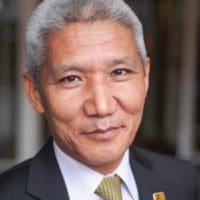Filmed during Mind & Life Institute’s “Mind & Life XXVI: Mind, Brain and Matter” on January 19, 2013.
Day Three: Neuroscience
Changing the Brain
SPEAKERS: His Holiness the Dalai Lama, Richard Davidson, PhD, and Tania Singer, PhD
The ability of the brain to change through experience, a capacity known as neuroplasticity, allows for exciting possibilities of human development and transformation. This session explored the implications of neuroplasticity in the areas of mental training, attention, emotion regulation and compassion. Richard Davidson provided a broad overview of the impact of mental training in altering brain circuitry and behavior relevant to attention and emotion regulation. The effects of mindfulness and loving-kindness/compassion practices on cortical and limbic functions will be described, as well as new findings on alterations of brain circuitry during sleep and epigenetics. Tania Singer introduced a model developed for a one-year compassion intervention program that consists of training in attention, interoceptive awareness, perspective taking and meta-cognition, loving-kindness, prosocial motivation and acceptance of difficult emotions. She then provided empirical evidence for affective brain plasticity after a one-week training of empathy as compared to compassion and loving-kindness. Overall, research in contemplative neuroscience suggests that mental training produces highly specific and enduring effects on brain function and behavior. What are the limits of neuroplasticity, and what does this mean for human potential?
MODERATOR: Arthur Zajonc
INTERPRETER: Thupten Jinpa
Exploring Neuroplasticity
SPEAKERS: Richard Davidson, PhD, Tania Singer, PhD, and Geshe Dadal Namgyal
This session delved further into the brain circuits underlying emotion and social behavior, exploring how neuroscientists approach these topics. Richard Davidson first introduced the field of affective neuroscience and focus on brain mechanisms of emotional learning and emotion regulation. He discussed the involvement of these circuits in producing craving and attachment, and how contemplative training can impact these circuits while cultivating emotional balance. Tania Singer complemented this view by introducing the field of social neuroscience, focusing on the questions of how people relate to and understand each other. She distinguished cognitive perspective taking from concepts of emotion contagion, empathy and compassion; the former represents a cognitive route to the understanding of others, the latter a motivational and affective one. Compassion is closely linked to a motivational system routed in affiliation and care, which in turn is associated with specific brain systems that help increase trust and reduce fear. Geshe Dadul Namgyal offered remarks from the Buddhist perspective on issues relating to affective and social neuroscience findings.
MODERATOR: Arthur Zajonc, PhD
PARTICIPANTS:
Michel Bitbol
Khen Rinpoche Jangchup Choeden
Sona Dimidjian
James R. Doty
John Durant
Anne Harrington
Wendy Hasenkamp
Bryce Johnson
Geshe Lhakdor
Rajesh Kasturirangan
Christof Koch
Lobsang Tenzin Negi
Vijayalakshmi Ravindranath
Matthieu Ricard
Geshe Ngawang Samten
Aaron Stern
Diana Chapman Walsh
Carol Worthman
Participants

His Holiness the 14th Dalai Lama
Honorary Board Chair

Richard J. Davidson, PhD
William James and Vilas Research Professor of Psychology and Psychiatry and Founder & Director of the Center for Healthy Minds, University of Wisconsin-Madison. Founder and Chief Visionary for Healthy Minds Innovations, Inc.

Tania Singer, PhD
Convening Faculty

Arthur Zajonc, PhD
Mind & Life Institute




